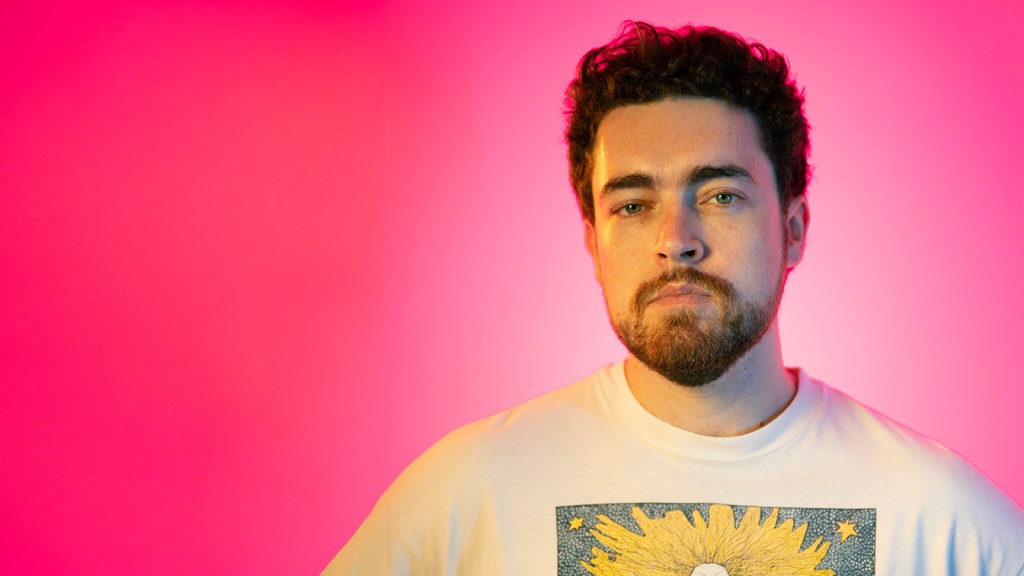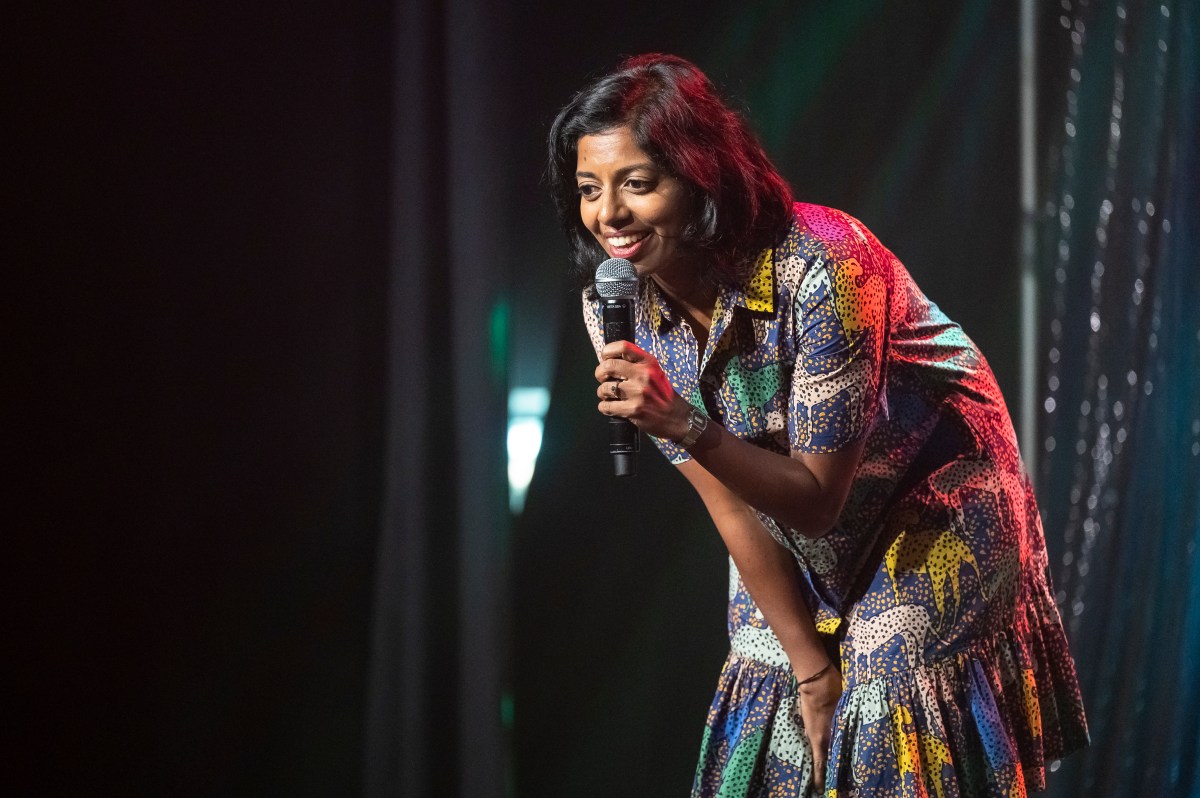In a recent interview with ArtsHub, veteran comic Damien Power reflected that television spots were once the be all and end all to a comedy career. Now, Power explained, there are multiple online paths that up-and-comers can take to elevate their career.
While the old favourites like doing radio and – of course – putting in the hours at comedy clubs are still vital pathways, increasingly, comedians can use different platforms such as blogging, podcasting and creating videos to find new audiences or show their fans different sides of their work, develop new revenue streams and explore other creative outlets.
Arts Hub speaks to four comedians who are using online platforms to build a following.
Nick White (online sketches)
When he was just seven years old, Nick White used to invent characters, draw them and even flesh out their backstories with houses and family members. These days, the Brisbane-born comic is still coming up with characters, but now millions are watching them on TikTok and Instagram.
‘I’ve always been fascinated by all walks of life and the people you encounter,’ he tells ArtsHub. ‘There are so many weird, funny, interesting people in the world, and you don’t notice that they’re unique until we point it out. I think that’s why my comedy resonates with a lot of people. It’s like, “Oh yeah, I know that person, but I’ve never really thought about their life”.’
White is now six years into his comedy career and has spent time in New York’s improv, stand-up and queer comedy scenes, but his work creating sketches for online platforms is a relatively recent development. It was initially a low-key sideline, but the sketches started catching on, and he now has almost 35 million likes on TikTok. His growing online profile has allowed him to leave his day job and become a full-time comedian and content creator.
As well as playing into his strengths in character work, White says the short online videos have brought a new wave of fans to his shows, including many who have never been to see stand-up before. ‘I do feel a bit of pressure in that regard because they don’t have any reference for live comedy,’ he says. ‘But I am very lucky that I have that audience from online.’
His festival show this year, Teenage Dream, spans both threads of his career, featuring autobiographical stand-up and a special appearance by his character “Carly”. ‘It’s mostly about trying to find a creative outlet that resonates with you,’ he says. ‘Growing up, I was always a strange kid; I was very observant and loved creative things, but I couldn’t find anything that didn’t make me feel like an outsider. It all clicked when I realised I was weird because I wanted to make people laugh. It’s the story of figuring that out, but also with the fun added element of one of my characters opening the show for me.’

Sashi Perera (Substack)
A nominee for Best Newcomer at the 2023 Melbourne International Comedy Festival, Sashi Perera is one of the fastest-rising stand-ups on the scene. But writing was her first love; she has written every day since she was a young child.
Perera has recently returned to these roots by joining Substack, an online platform that allows all types of writers to publish and monetise subscription newsletters. Her Substack, titled Sashi Writes, has been a hit, quickly building a following internationally.
‘Going to Substack has allowed me to deepen the relationship with the audience, which I’ve really been liking,’ Perera says. ‘In comedy, you’re both a writer and a performer, and I think I’m a writer first, so this [platform] is allowing me to spend more time doing that part of the process. It’s also a much more direct relationship [than stand-up]… I like that it allows me to send a newsletter directly to their inbox, and they reply directly to mine.’
Having an outlet outside comedy has allowed Perera to explore more serious territory without needing to keep it light or write punchlines – one entry covers her gruelling journey through miscarriages and IVF. Despite the differing tones, however, she says many fans of her comedy also follow her Substack. ‘I see it as a deepening relationship with the audience I already have, as opposed to it being like a side project,’ she says.
Perera is interested in continuing to work in television writers’ rooms and potentially writing a book down the line, but with festival season upon us, she is currently focused on her second stand-up hour, Boundaries. Talking to ArtsHub from Colombo, Sri Lanka, where she has recently played a sold-out show, Perera says she has grown in confidence since her debut solo show last year.
‘It’s a term I learned when talking to a white therapist about the complexities of South Asian family dynamics and all the confusion that brought up for me, navigating the very different aspects and the dynamics of when you’re brought up in a collective society versus an individualist society,’ she explains. ‘It’s a tricky thing for a lot of people, but especially in the South Asian community, it seems to be resonating.’
Chloe Maddren (Podcasts)
When flaky friends kept thwarting Chloe Maddren’s plans to start a joint podcast, she took matters into her own hands and started her own, titled The Friend Request. ‘It’s about me being a needy friend and talking about friendship and all of the weirdness that it brings,’ she says.
The podcast has helped Maddren make further inroads into the stand-up comedy world as she prepares for her debut festival hour, Hot Girl Stuff. She’s enjoyed the process and getting to know the guests – including friends from the comedy scene and one of her inspirations, Becky Lucas – a little better.
Since starting her podcast, Maddren has become a more prolific guest on other shows, including a recent appearance on prominent US history/comedy podcast The Dollop. The Friend Request has also allowed her to further connect with the international audience that found her through the popular YouTube channel YeahMad.
While many comedy podcasts are filmed online or over the phone, Maddren has a policy of only recording in-person conversations in a pillow fort set that recalls the cosy intimacy of a child’s play space. ‘Being in the pillow fort with me is a big part of the vibe and a [way] that I get guests to open up,’ she says.
Read: Making the jump from RAW comedy
Maddren promotes the podcast online with clips from each episode, but resists choosing the most clickbait-friendly moments. ‘Unfortunately, I have morals,’ she laughs. ‘Sometimes I’ll be editing the podcast, and I’ll think, “Oh, this would go absolutely insane on Instagram”, but I know that it’s not the kind of thing that should be taken out of context.’
While The Friend Request usually offers super fans the chance to subscribe for special interactive content, Maddren has recently paused this option to focus on her festival show. Like her podcast, she says Hot Girl Stuff will tackle some serious territory – including disordered eating and online misogyny – with a lightness of touch.
‘It’s sad, but also really funny, I swear. I’d expect it to be a bit of a rollercoaster because it talks about mental health and those issues. It’s pretty relatable stuff; there are so many people all around us that have weird food stuff going on and it’s fun to learn about.’
Marcel Blanch-de Wilt (Patreon)
During the lockdown era, Blanch-de Wilt was doing online one-on-one coaching with comedians, and thought bringing in other voices as coaches and mentors would be useful. This project led to him starting online writing workshops for both emerging and established comics looking to upskill. ‘Then, after the pandemic, I realised that there was still a hunger for that type of meet-up because mentoring is sorely lacking in the comedy world,’ he explains. ‘The other motivation is that comedy can be a very isolating environment for new comedians especially. They come in and think, “Oh, this is lonely, where are my people?”’
Blanch-de Wilt has used Patreon, a monetisation platform that allows content creators to run a subscription service and sell their digital products – in his case, online workshops and podcasts. ‘I wanted to be able to monetise it because I can’t do anything for free, so Patreon became the ideal pathway.’
His Patreon, The Comedy Writers Group, has proved a success and is just about to pass 200 members. It gives Blanch-de Wilt another revenue stream and facilitates a varied professional and creative life: he often teaches comedy and corporate presentation skills by day and then does stand-up and sketch comedy by night. He has two festival shows this year: Newlyweds, a completely improvised play with his wife, Eleanor, and Let Me Eat Cake, a stand-up show that argues we all need a little treat now and then, especially in this time of a cost of living crunch.
He values the ability to be involved in the comedy scene as both a performer and behind-the-scenes figure. ‘I love performing because that’s where the biggest dopamine hit comes from. But I am discovering a real joy associated with sitting in an audience for a show I’ve had a hand in and going, “Oh, I’m up there as well.” What has also been nice is a lot of the mentors that I’ve recruited have found that mentoring reminds you why you got into this in the first place. You’re meeting people new to this and they still have that spark in their eyes. That spark is contagious.’





